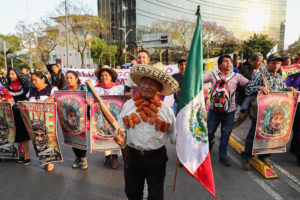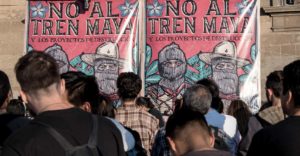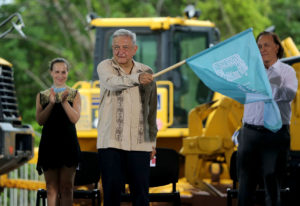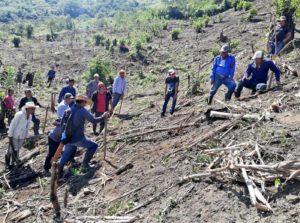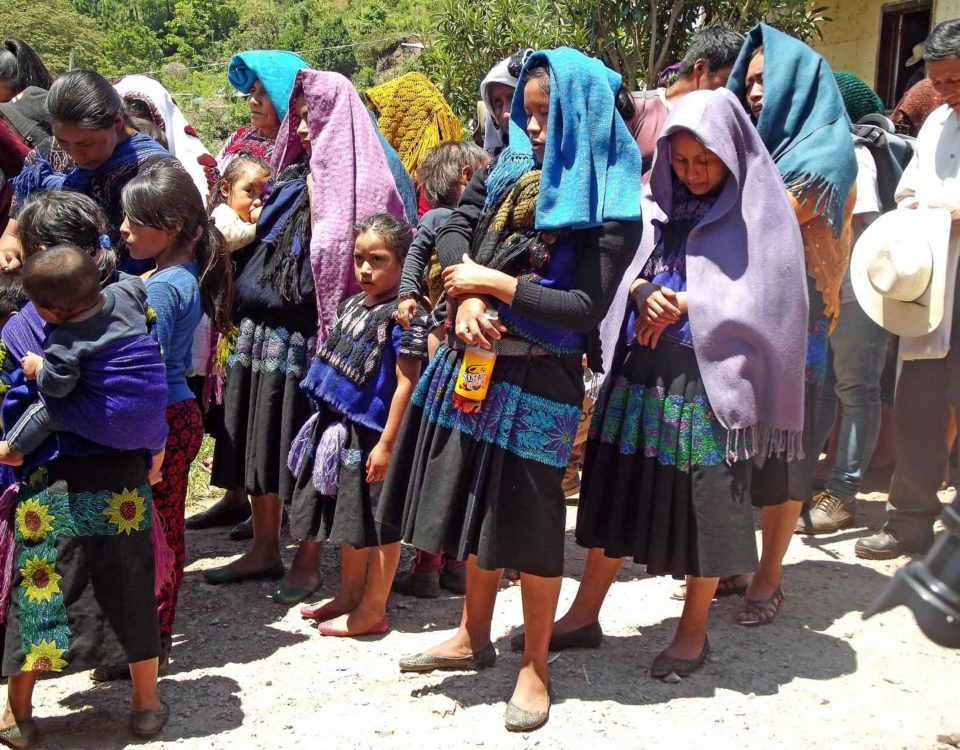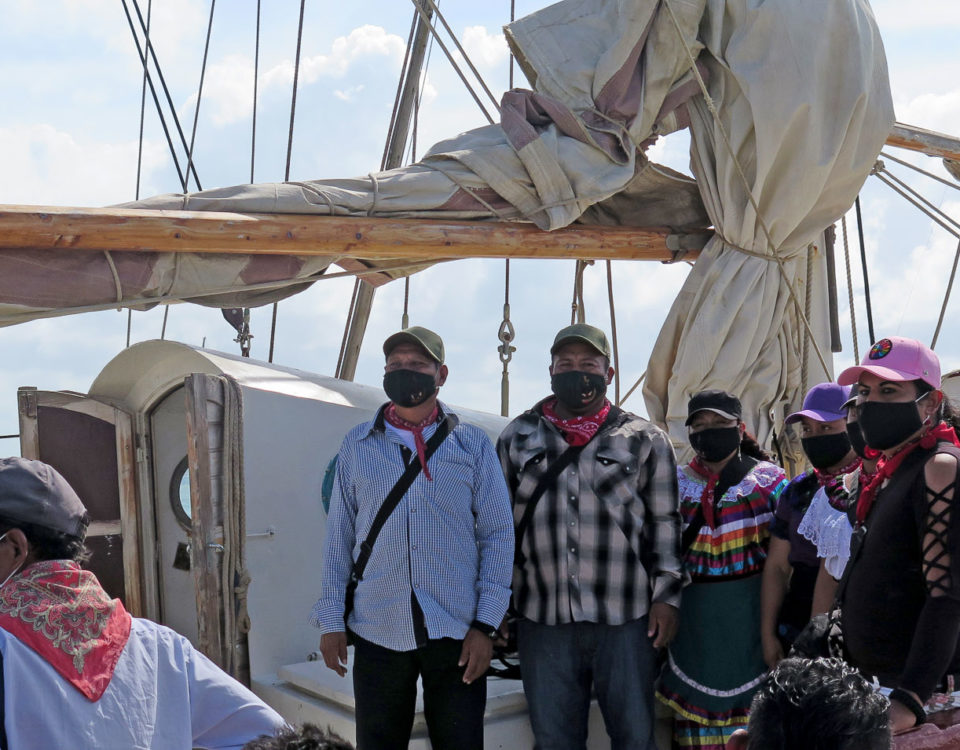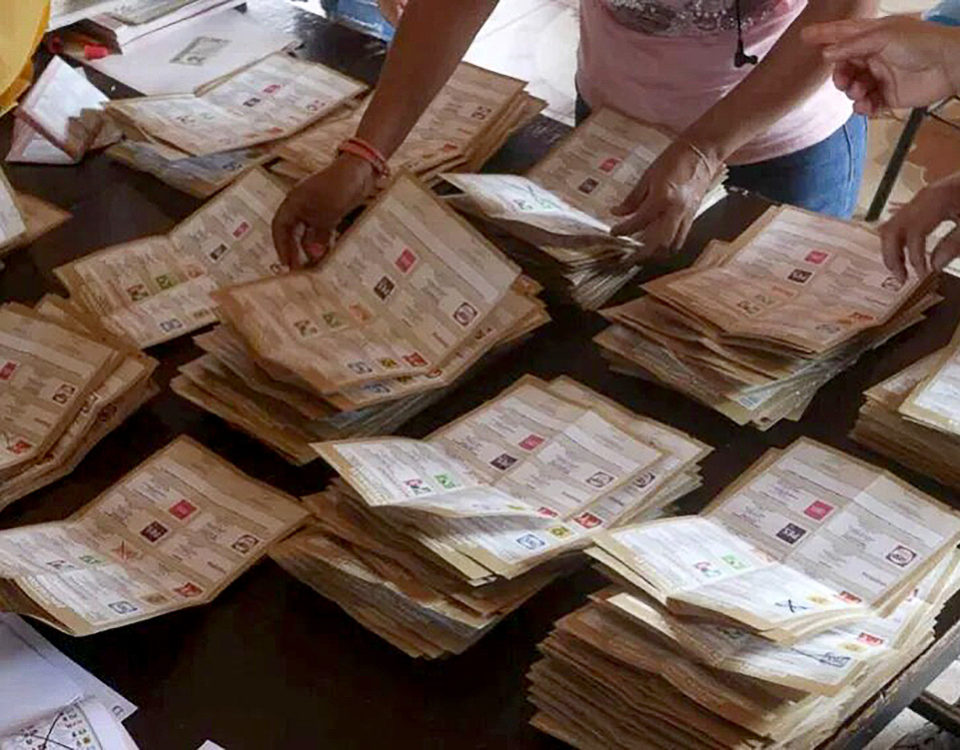
LATEST: Mexico – June 6th Elections, biggest and most violent in history
03/10/2021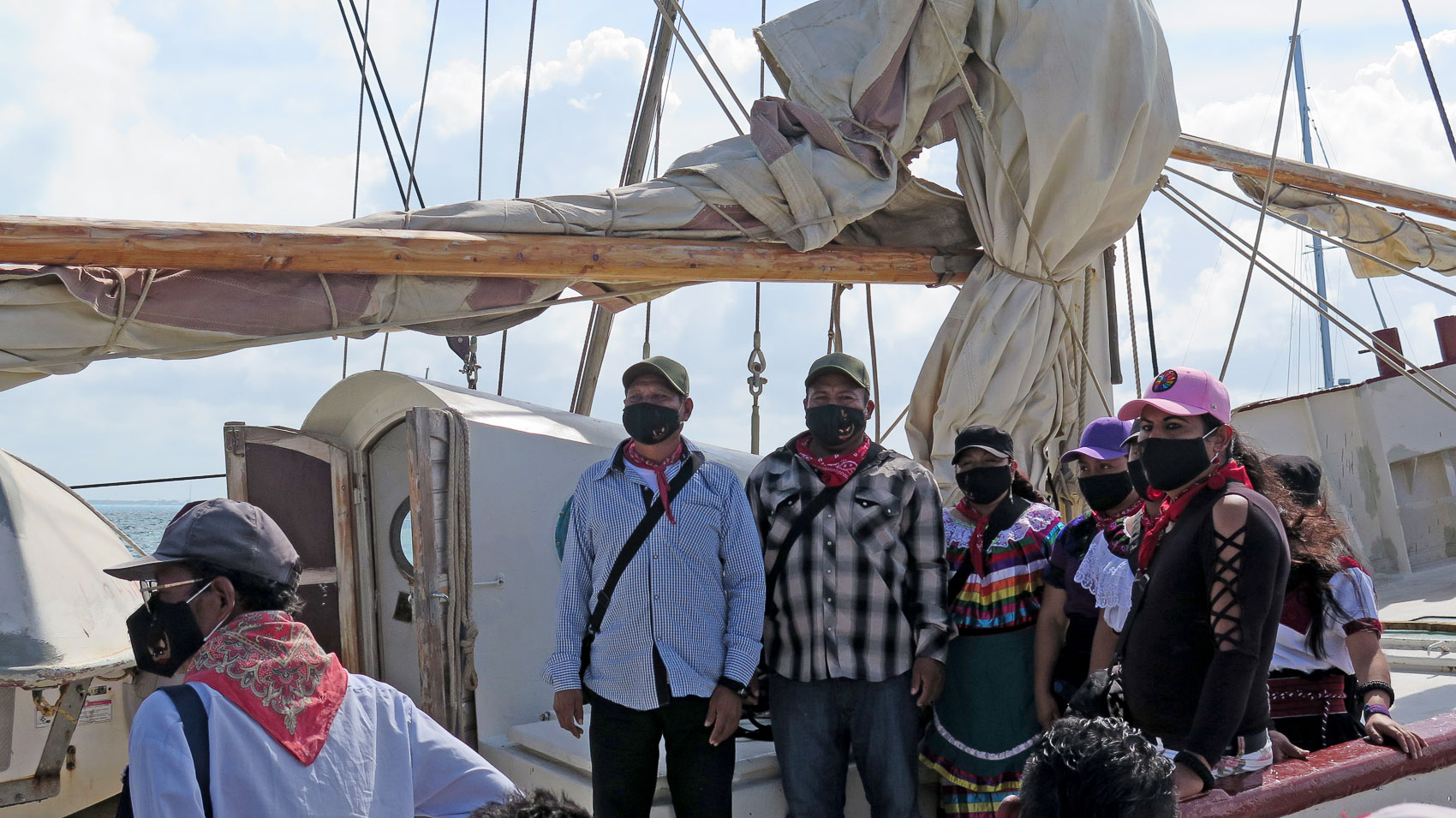
ARTICLE: Zapatista World Tour – “Journey for Life – Europe Chapter”
03/10/2021The Escazu agreement “is a demonstration in favor of multilateralism in Latin America and of cohesion as a region (…) it places people and rights at the center.
From Escazu upward and onward, but nothing backward. “
The Regional Agreement on Access to Information, Public Participation and Access to Justice in Environmental Matters in Latin America and the Caribbean (better known as the Escazu Agreement as it was adopted in the Costa Rican city of that name), is a pioneering legal instrument on environmental protection, and at the same time a human rights treaty that proposes a transformation of environmental governance.
Adopted on March 4th, 2018 and in force since April 22nd, 2021, it aims to “fight against inequality and discrimination and guarantee the rights of all people to a healthy environment and sustainable development, dedicating special care for people and groups in vulnerable situations and placing equality at the center of sustainable development”, as can be read in the foreword to this instrument.
However, Escazu is not the only source of obligations in this matter for Mexico. The right to a healthy environment is also considered in Article 4 of the National Constitution; Article 11, of the Additional Protocol to the American Convention on Human Rights in the area of Economic, Social and Cultural Rights -Protocol of San Salvador-, and in the corpus of the main international human rights treaties.
Unfortunately, for many specialists, these standards have not been homologated with the rest of the national regulatory framework, nor are they translated into practice, and what is more, they are in constant contradiction with the extractivist economic model that the current government has promoted. This economic model is strongly anchored in the development of megaprojects that involve the large-scale exploitation of natural resources, given that they are generally located in areas of high biological diversity, many of which are historical territories of indigenous peoples.
As the Mexican Center for Environmental Law (CEMDA) explains, this type of project is closely associated with the deepening of inequality gaps, the worsening of precarious contexts and human rights violations, such as the right to the environment, to an adequate standard of living, health, water, culture, access to justice and the defense of human rights. On the other hand, they have environmental impacts such as the contamination of natural resources, the obstruction of access to these resources, the decrease in biodiversity and profound social damages such as forced displacement, the impact on traditional production methods and pressure on forms of local organization.
Faced with this context of socio-environmental violence, the ratification of the Escazu treaty acquires enormous importance, particularly because it obliges the Mexican government to guarantee access to information, public participation in decision-making processes, and access to justice in environmental matters, which also implies the strengthening of capacities to protect people who defend their right to a healthy environment, an axis of vital relevance in one of the ten most dangerous countries to defend human rights in the world.
Areas of Implementation of Megaprojects
Megaprojects in Mexico are carried out in several areas: infrastructure projects (clear examples are: the Tehuantepec Isthmus Interoceanic Corridor and the Maya Train Development Project, located in the Yucatan Peninsula), energy projects (such as the Dos Bocas Refinery in Tabasco), mining extractivist projects, and agro-industrial projects. They are frequently singled out for their high environmental and cultural risks, and are sometimes linked to cases of violations of the right to information, consultation and participation of local communities.
Faced with these projects, Jose Angel Gurria, secretary general of the Organization for Economic Cooperation and Development – OECD, asked the Lopez Obrador government to be consistent with the commitments that Mexico has assumed in terms of respect for the environment and climate change. He also emphasized that Mexico must continue the line that has marked its leadership and active participation in the multilateral sphere in favor of the environment.
Now we will delve into the “Sembrando Vida” (Sowing Life) program, the most important environmental commitment of the current administration, which has much greater resources than those of the National Forestry Commission, the General Forestry Directorate and the Federal Attorney for Environmental Protection. We emphasize this program given its repercussions in the southern part of Mexico and because it exemplifies the chiaroscuro of the government development discourse versus its social, economic and environmental results.
The Sembrando Vida program has a dual purpose, since it not only seeks to address rural poverty, but also environmental degradation through the planting and cultivation of fruit and timber trees. For this, a subsidy of 5,000 pesos a month is granted, which represents an important support for the families of the localities with higher levels of social backwardness, to whom it is directed. Of these 5,000 pesos, 500 are allocated to savings that are managed by the sowers themselves, who will be able to use their benefits from the third year of the program. Cooperatives have been formed to carry out their administration, as well as for the future commercialization of the trees.
According to information on the program’s official website, to date there are 420,256 beneficiaries, of which 70.1% are men and 29.9% are women, and it is present in 20 states (23,507 localities, 884 municipalities and 8,917 ejidos). The implementation of Sembrando Vida is accompanied by 28 territorial coordinators and three regional coordinators, 419 facilitators, 2,115 productive technicians, 2,093 social technicians and more than 35,000 scholarship recipients of the Youth Building the Future program, with whom generational renewal in the field and rootedness to the earth is promoted.
In addition, the producers are part of a learning community (Campesino Learning Communities – CAC) made up of 25 farmers who receive training accompanied by a social technician. The National Council for the Evaluation of Social Development Policy – CONEVAL, highlights the CAC as spaces that promote the generation of intergenerational dialogues and meetings, which recover traditional knowledge through the exchange of experiences and knowledge between legal subjects and technicians of the program, while at the same time improving and increasing their crops to guarantee their own consumption in a sustainable way.
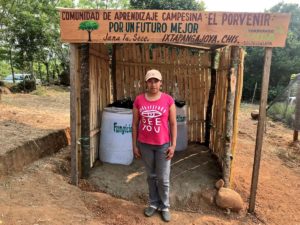
Peasant Learning Community part of the Sembrando Vida Program in Ixtapangajoya, Chiapas © Sembrando Vida
Studies by the World Resources Institute (WRI), Mexico Section, indicate that, if the program complies with the restoration of the 416 thousand hectares of Timber Agroforestry Systems for the eight states that started the program in 2019, and It maintains them for at least 30 years, between 46.8 and 50.2 million net tons of CO2 could be captured, which would mean an important achievement with very significant impacts on the environment.
Nevertheless, Sembrando Vida is not an environmental policy nor does it replace the actions of the institutions in charge of promoting forest management, use and protection. Among its negative environmental impacts, it has been documented that, in some regions, such as Chiapas and the Yucatan peninsula, the design of Sembrando Vida has led to the removal of forest to be able to enroll plots in the program. According to data from the WRIs, the program “could have encouraged a loss of forest cover of 72,830 hectares during the first year of operation (2019)”. These losses are concentrated in only 22 municipalities in the country and in regions vulnerable to climate change and of large biodiversity of Chiapas, Tabasco, Veracruz, Yucatan, Quintana Roo and Campeche. Bernardo Chankin, leader of a village in the Lacandon Jungle in Chiapas, comments that less than a third of the families in his village accessed the program because the community refused to cut down trees, “as Lacandons, we dedicate ourselves to conservation” and that “now the rivers and wells in this part of Chiapas are drying up due to deforestation.”
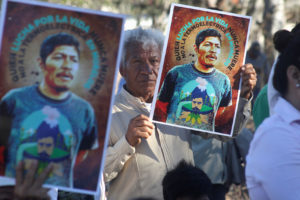
Samir Flores, one of the environmental defenders assassinated in the past six years © Reuters/Margarito Pérez-Retana
In addition to deforestation, families, if they renounce their self-production plots, are forced to purchase of food that they could previously produce themselves, generating a problem of food dependency, a concern that was raised at the women’s meeting held in June 2021, in the Tim community of the municipality of Chilon, in Chiapas. On the other hand, planting non-native trees in new regions could have unexpected and unintended consequences on ecosystems.
Similarly, negative socio-cultural impacts have been presented, as pointed out by the Xinich indigenous organization, made up of the Ch’ol, Tseltal and Zoque indigenous peoples of the Lacandon Jungle of Chiapas: on the one hand, intra and inter-community tensions have increased, due to the differences regarding whether to form part of the program or not, and if so, with how much land area, how many participants, and so on.
On the other hand, the SERAPAZ Ocosingo team has pointed out gender-based impacts, which have negatively and disproportionately affected women since they often do not have property titles. As can be seen, there is a strong disparity in the proportion of beneficiaries, with a ratio of 70:30 men to women. Finally, several cases of corruption have been observed, since there were people who entered the program even without land.
Finally, it is worth mentioning that in Central America, Sembrando Vida projects have already begun in Honduras and El Salvador, following agreements between Presidents Lopez Obrador and Juan Orlando Hernandez and Nayib Bukele, respectively. On the occasion of a climate summit, Lopez Obrador proposed expanding the implementation of these programs in Central America, through the support (financial and migratory) of the United States government, in order to address the causes that generate the expulsion of people from their birthplace. “We assume our economic responsibility and commit ourselves to help in the productive and social organization, and you, President Biden, could finance the Sembrando Vida program in Guatemala, Honduras and El Salvador”, Lopez Obrador stated. However, analyst Ariel Ruiz, from the Migration Policy Institute (MPI), warns that initiatives such as Sembrando Vida have yet to demonstrate their effectiveness: “By themselves, these programs would not reduce migration flows in the short term. The implementation and evaluation of Sembrando Vida in Mexico is still in progress in southern Mexico and Central America and, as a result, it is too early to quantify its impact on migration flows.”
Implications of the 4T Proposal
Parallel to the implementation of megaprojects, other indicators are observed that cast doubt on the current government’s fight against climate change. On the contrary, the generation of fossil fuels has been favored, minimizing the impacts of the use of hydrocarbons on public health and climate change, and ignoring compliance with Mexico’s international commitments in this regard.
In this sense, on the occasion of the approval of the Electricity Industry Law on March 2nd, ambassadors of the European Union voiced their concern to MORENA senators about said reform that, they consider, will promote the use of dirty energy and that could lead to a tangle of international arbitrations. Jean Pierre Bou, Charge d’Affaires of the European Delegation in Mexico considered that Mexico should continue to “take advantage of the potential of clean energies.”
In the words of Gustavo Alanis, director of CEMDA, “The priorities are the President’s projects, they are not the environment, natural resources, they are not environmental institutions (among the examples we see), the breach of the Paris Agreements, the climate change law and the energy transition law in Mexico.”
At the same time, there has been a significant reduction in the budget of the institutions of environmental relevance, “proof of this is that since 2017, the government budget assigned to the environment and natural resources has decreased by approximately 20%”, as CEMDA presented in its March 2021 report. As the Secretary of the Environment and Natural Resources, Víctor Toledo, commented at the time, “it is strange that a government aimed at rescuing millions of families from marginalization and poverty and seeking social welfare do not assume the importance of restoring nature and protecting the environment (…). The above is expressed in the budget. Under the new government, the Ministry of the Environment and Natural Resources received six billion pesos less than it did in 2018 with Peña Nieto, and its 2020 budget represented only 2.52 percent of what was granted to fossil fuels (SENER, PEMEX and CFE).”
On the other hand, as Laura Becerra from Equipo Pueblo points out, the attitude of omission persists in the advertising of information related to projects that impact ecosystems, the lack of guarantees for citizen participation in these projects, and the persistence of public policies that do not allow true democratic, culturally appropriate, or environmentally sustainable participation.
Finally, one of the most worrying elements is the serious gaps in the protection of defenders of land, the environment and territory, who are even stigmatized and criminalized in their work. According to the Ministry of the Interior, from December 2018 to July 12th, 2021, 68 defenders have been murdered. In addition to the attacks they receive from State agents, in several cases defenders are confronted by organized crime. These events occur in a generalized context of violence, impunity and corruption.
In this regard, we recall the urgent action addressed to the Mexican State published at the end of February of this year by four special rapporteurs and the working group of the United Nations on arbitrary detention, in which they expressed their concern about the use of prosecution in retaliation against the work of defense of environmental rights and of the territory in Oaxaca, Chiapas and Queretaro.
Faced with this reality, Escazu tries to provide a medium-term response. But it will also allow us to start demanding a safe environment and effective protection for environmental rights defenders, more up-to-date information systems that can reach communities in culturally appropriate formats. In terms of justice, it can be a roadmap to develop a component that has not been developed in Mexico: specialized environmental courts, provided for in Article 8 of the Agreement. In this sense, Tomas Severino, Director of Cultura Ecologica, A.C., explains that Escazu will allow us to promote the environmental governance agenda, in addition to the opportunities that are opened up for constantly marginalized groups: women, young people, inhabitants of rural areas.
Defense of the environment. The Civil Society Front
Civil society organizations (CSOs) have played a fundamental role in defending nature and communities. Confronting and reversing environmental problems that seriously affect not only ecosystems but also public health and the ways of life of millions of Mexicans in cities and rural areas, requires important economic changes and faces great political resistance. As CEMDA points out, public interventions developed by the three levels of government are needed to help prevent and reduce damage to the environment, and to reduce vulnerability and strengthen the adaptation of the population, ecosystems and productive systems to the effects of climate change.
Among the proposals heard from the CSO front, we find the creation of a national climate change policy with a gender perspective (which has already been raised at international level in the Conferences of the Parties – COP); the adoption of public policies aimed at guaranteeing and monitoring the effective application of the Guiding Principles on Business and Human Rights; and also to guarantee, through accessible and culturally appropriate platforms, access to information and the promotion of equal participation of women and men in environmental matters in accordance with the highest international standards, especially as outlined in the Escazu Agreement. In the same way, CSOs call for guaranteeing the right of access to environmental justice for all women, men, peoples and communities, as well as the impartiality and independence of people who administer justice in contexts of business activity or megaprojects, as CEMDA stated in its Report on the situation in Mexico of environmental human rights in the context of megaprojects in March 2021.
Furthermore, Daniel Martin, Director of the Sustainable Development Area of the Civic Collaboration Center, highlights that the Escazu Agreement offers us several opportunities, since its legal framework provides a strong support to advance in the fulfillment of the Sustainable Development Goals , mainly SDG 13 (climate action) and SDG 16 (peace, justice and strong institutions). Particularly by promoting access and maximum publicity of environmental information (Article 6), which will promote decision-making based on evidence (for example, in relation to vulnerability to climate change). On the other hand, the Escazu Agreement opens the door to citizen participation in decision-making related to their environment (Article 7), which must materialize in formal spaces for dialogue between the Government and civil society. In addition, rapid and effective processes of justice in environmental matters (Article 8) can be guaranteed, as well as safe means to protect the environment (Article 9), which will impact the strengthening of the fight for climate justice and protection of the defenders of the environment.
For Escazu to not remain merely as good intentions, Mexico has to assume and comply with the obligations related to its ratification, which implies the strengthening of the promotion of transparency and access to information, the participation of citizens in taking decisions on environmental matters, as well as the protection of environmental rights defenders.
The challenges are of extreme urgency: underestimating environmental challenges means ignoring the context of global crisis that has triggered climate change. Human health and environmental health are but two sides of the same coin.
Sources:
- Aristegui Noticias, A 2 años de la 4T, ¿qué atención reciben los problemas ambientales?, 1 de diciembre 2020. Disponible en: https://aristeguinoticias.com/0112/mexico/a-2-anos-de-la-4t-que-atencion-reciben-los-problemas-ambientales-articulo/
- Brooks Darío, BBC News Mundo, “Sembrando vida”: qué es el programa con el que AMLO plantea frenar la migración de Centroamérica (y qué resultados ha tenido en México), 23 abril 2021. Disponible en: https://www.bbc.com/mundo/noticias-america-latina-56853807
- Centro Mexicano de Derecho Ambiental, Comunicación y Educación Ambiental, Cultura Ecológica, Centro de Colaboración Cívica, Fundar Centro de Análisis e Investigación, Amnistía Internacional Con la Ratificación de México y Argentina el Acuerdo de Escazú Entrará en Vigor. Disponible en: https://www.cemda.org.mx/wp-content/uploads/2021/01/mexico-argentina-escazu.pdf
- Centro Mexicano de Derecho Ambiental, A.C. (CEMDA), Informe sobre la situación en México de los derechos humanos ambientales en el contexto de megaproyectos, marzo 2021. Disponible en: https://www.cemda.org.mx/wp-content/uploads/2021/06/informacion-derechos-humanos.pdf
- Centro Mexicano de Derecho Ambiental, A.C. (CEMDA), Evaluación de la política climática en México. Diagnóstico del cumplimiento de metas programa especial de cambio climático 2014-2018. Disponible en: https://www.cemda.org.mx/wp-content/uploads/2019/05/CEMDA-Evaluaci%C3%B3n-Pol%C3%ADtica-Clim%C3%A1tica_v2final.pdf
- Climate Action Tracker, México. Disponible en: https://climateactiontracker.org/countries/mexico/assumptions/
- Climate Transparency, México. Reporte sobre transparencia climática comparación de la acción climática del G20 y las respuestas a la crisis de Covid-19. Disponible en: http://www.iniciativaclimatica.org/wp-content/uploads/2021/01/Mexico-CT-2020-WEB2-2-TRAD4.pdf
- Cultura Ecológica, Comunicación y Educación Ambiental, Centro Mexicano de Derecho Ambiental, Fundar Centro de Análisis e Investigación, Centro de Colaboración Cívica y Amnistía Internacional, Comunicado: El Acuerdo de Escazú es vigente en México, 10 de diciembre de 2020. Disponible en: https://amnistia.org.mx/contenido/index.php/el-acuerdo-de-escazu-es-vigente-en-mexico/
- Gobierno de México, Secretaría de Bienestar, Programa Sembrando Vida. Disponible en: https://www.gob.mx/bienestar/acciones-y-programas/programa-sembrando-vida
- García-Tobón, A., C. Brown-Sola, M. A. Palmeros y A. Castillo-López. Cuidar lo que importa: Presupuesto para el Patrimonio Natural. Una Mirada al Presupuesto para las Áreas Naturales Protegidas. Fundar, Centro de Análisis e Investigación, Sociedad de Historia Natural Niparajá y Pronatura Noroeste. Ciudad de México 2020. Disponible en: https://fundar.org.mx/wp-content/uploads/2020/05/Cuidar-lo-que-importa-presupuesto-patrimonio-natural-2020.pdf
- Gonzalo Ortuño, Recortes y promesas incumplidas: el medio ambiente no es prioridad en el gobierno de AMLO, 7 de octubre 2020 en Animal Político. Disponible en: https://www.animalpolitico.com/2020/10/recortes-promesas-incumplidas-medio-ambiente-amlo/
- Leticia Merino, A 2 años de la 4T, ¿qué atención reciben los problemas ambientales?, en Aristegui Noticias 1 de diciembre 2020. Disponible en: https://aristeguinoticias.com/0112/mexico/a-2-anos-de-la-4t-que-atencion-reciben-los-problemas-ambientales-articulo
- Marilyn Alvarado Leyva y Mayra López Pineda, Acuerdo de Escazú: Estado mexicano, obligado a garantizar derecho a la información medio ambiental, 23 de enero, 2021 en Animal Político. Disponible en: https://www.animalpolitico.com/altoparlante/acuerdo-de-escazu-estado-mexicano-obligado-a-garantizar-derecho-a-la-informacion-medio-ambiental/
- Martínez, Fabiola y Garduño, Roberto, Necesario, ayudar a EU en asuntos migratorios, dice AMLO, en La Jornada, 26 de agosto de 2021. Disponible en: https://www.jornada.com.mx/notas/2021/08/26/politica/necesario-ayudar-a-eu-en-asuntos-migratorios-dice-amlo/
- México Social, Resultados de la evaluación de diseño del programa Sembrando Vida. Disponible en: https://www.mexicosocial.org/evaluacion-de-diseno-del-ptrograma-sembrando-vida/
- Organización de las Naciones Unidas, Acuerdo Regional sobre el Acceso a la Información, la Participación Pública y el Acceso a la Justicia en Asuntos Ambientales en América Latina y el Caribe, p. 5 y 6. Disponible en: https://repositorio.cepal.org/bitstream/handle/11362/43595/4/S1800429_es.pdf
- Seminario Universitario de Sociedad, Medio Ambiente e Instituciones de la Universidad Nacional Autónoma de México, Conversatorio: Implicaciones y oportunidades para México de la implementación del Acuerdo de Escazú, 25 de febrero 2021. Disponible en: https://susmai.unam.mx/escazu/
- Toledo, Víctor M., La 4T ante los desafíos ambientales, 17 de noviembre de 2020 en La Jornada. Disponible en: https://www.jornada.com.mx/2020/11/17/opinion/022a1pol
- WRI México, Boletín de prensa: Analizan impactos forestales y potencial de mitigación de Sembrando Vida, 17 de marzo 2021. Disponible en: https://wrimexico.org/news/bolet%C3%ADn-de-prensa-analizan-impactos-forestales-y-potencial-de-mitigaci%C3%B3n-de-sembrando-vida

